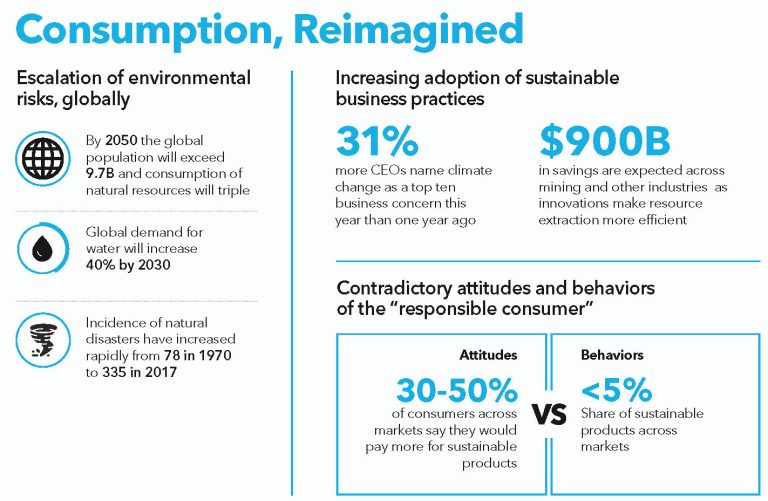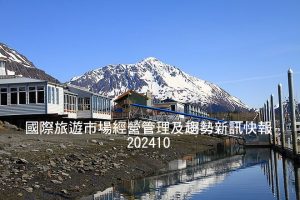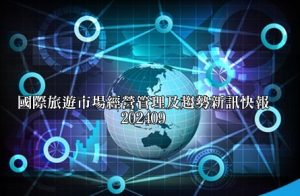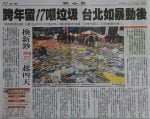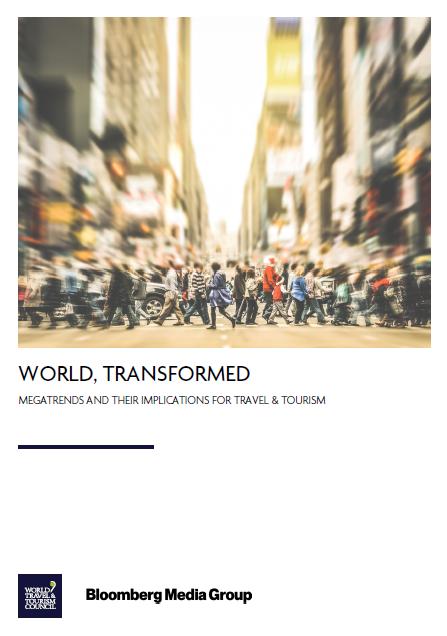
世界旅遊及旅行理事會(World Travel & Tourism Council, WTTC)協同彭博媒體集團於2019年1月出版《世界已經轉變—旅遊業的大趨勢及其意涵》(WORLD, TRANSFORMED: MEGATRENDS AND THEIR IMPLICATIONS FOR TRAVEL & TOURISM)報告,前言說:
世界正在轉變。變革的規模、範圍和復雜性不同於人類以往所經歷的一切,撼動了社會早就視為常規的基礎。這些匯聚的力量—或稱大趨勢—為已經認知且調整策略的人提供了無限的機會。
The world is transforming. The scale, scope, and complexity of change
旅遊業是增長最快的產業之一,佔2017年全球GDP的10%以上,若想保持增長並在2030年前達到18億國際旅客量的預估值,則須要不斷的創新和重塑。產業領導者要有靈活的前瞻,才能因應顧客新的需求和期望、下一次的數位革命,以及更高的業務風險。
Travel & Tourism is one of the fastest growing sectors, accounting for more than 10% of global GDP in 2017. Sustaining its growth and hitting industry forecasts, such as 1.8 billion international arrivals by 2030, will require
我們調查的這五項變革又相互關聯的大趨勢,對上述需求所應發展的策略提供了指引。
Our examination of five transformative, interlinked megatrends offers a guide to developing such strategies.
世界旅遊及旅行理事會執行長GLORIA GUEVARA說:我們生活在一個快速變化的時代。匯聚的強大力量正從根本上改變我們的生活與工作方式,並與世界各地產生互動。也因為這樣,又推動了新的商業需求,而對旅遊業而言,更是獨一無二的機遇和挑戰。公司、客戶和員工都會受到這些轉變的影響。在過去的一年裡(編按:指2018年),替選住宿市場增長30%(傳統在線訂房服務則只增長9%),該產業已經看到了非常規化的商業模式正持續加速進行中。
We live in an era of rapidly accelerating change. Powerful forces are converging to fundamentally alter ways of living, working and interacting all around the world.
That, in turn, is driving new imperatives for business – and unique opportunities and challenges for the Travel & Tourism sector. Companies, customers and employees alike will be affected by these transformations. Over the past year, the sector has seen unconventional business models continue to accelerate, with the alternative accommodations market growing at 30% (compared to 9% growth of traditional online booking services).— GLORIA GUEVARA / President & Chief Executive Officer / World Travel & Tourism Council
我將該報告所寫的五大趨勢的簡要說明翻譯成中文,請參考:(如有錯譯敬請不吝指正)
(附註:這五大趨勢的重點若不是很能理解,請參閱該報告內文的細項說明。)
趨勢一:強化真實感受(詳細說明在報告第3頁)
凡事講求體驗的今日世界,是因為人們渴望充實個人生活、自我導向和參與社群所推動形成的。
隨著人們、社群和企業對協同人性和之前類比經驗的科技需求變得更加複雜,於是浮現了如何過著最好的互聯生活的新想法和信念。從購物到社交到消費媒體,在線和離線體驗正變得愈來愈結合在一起。憑藉著旅遊業的核心經驗,有潛力設計出有意義的、獨特的、順暢的、甚至不插電的旅程,直接應對這些不斷變化的價值觀。
REALITY, ENHANCED
Today’s experience-driven world is fuelled by a desire for personal enrichment, self-direction, and community.
As people, communities and businesses become more sophisticated about the ways technologies can work in concert with human nature and
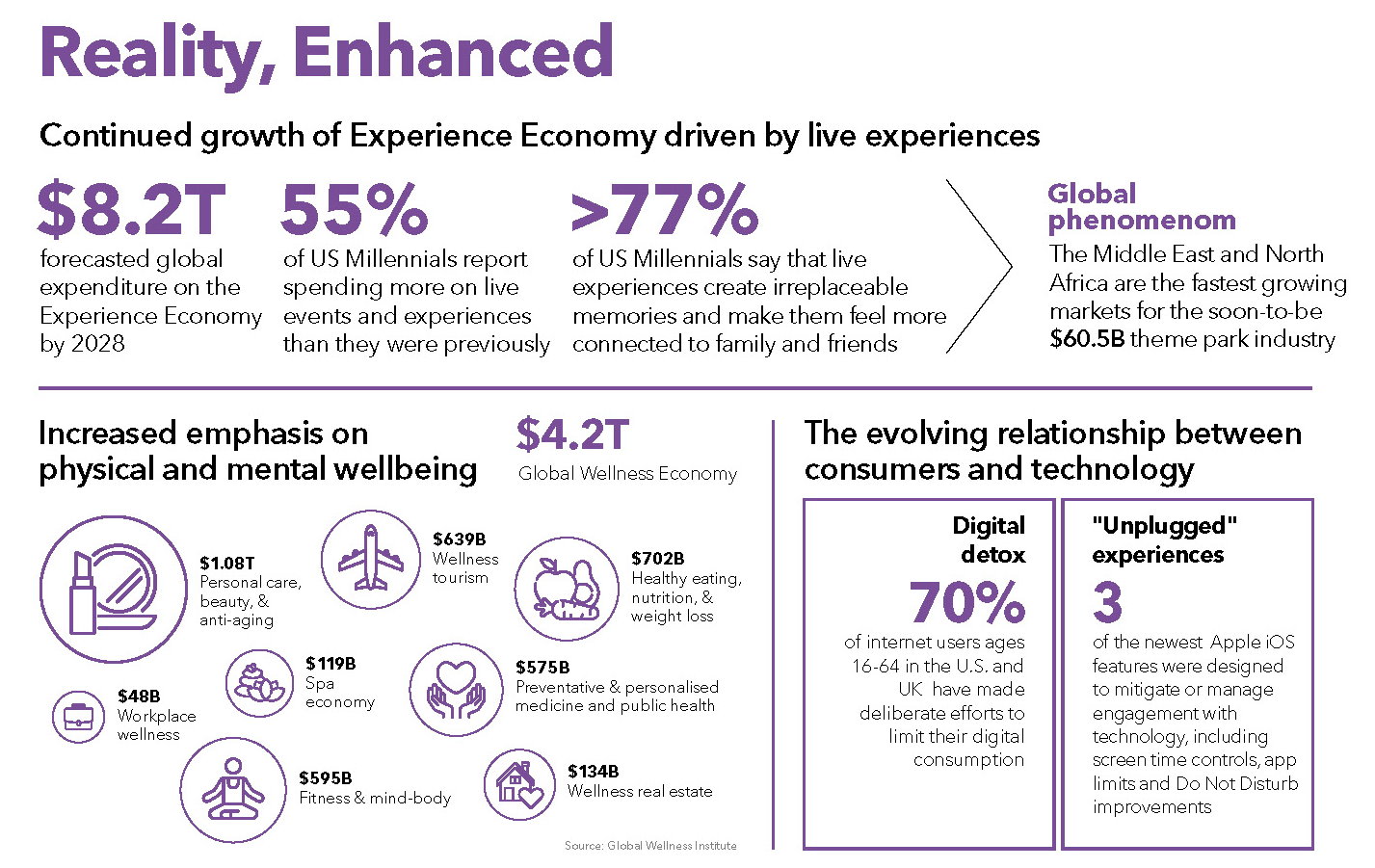
趨勢二:重新建構生活模式(詳細說明在報告第5頁)
零工和共用經濟正在重新定義各種關係,瓦解各行各業並創造對工作和生活的新期望。
「零工經濟」和「共用經濟」註等科技驅動型經濟型態的增長繼續重新定義各種關係,瓦解各行各業並創造對工作、生活和文化的新期望。 流動性,自主性和社會參與度都在提升。 這可以從工作與休閒之間的傳統界限崩解以及希望掌握所有權的價值取向的增加而看出。 隨著新的經濟和生活方式趨勢的加劇,旅遊業將迎來新增的機遇,並面對新的期待。
(註):我不同意「Sharing economy」翻譯中文為「共享經濟」,因為「分享」、「共享」在中文是善意且幾乎不求報酬的給予,但時下「Sharing economy」只是一種「一物多人用,一物多人PAY」的商業模式,與中文「分享」原意差距甚大,所以我翻譯成「共用經濟」。
LIFE, RESTRUCTURED
The gig and sharing economies are redefining relationships, disrupting industries and creating new expectations for work and life.
The growth of tech-powered economies such as the “gig economy” and “sharing economy” continues to redefine relationships, disrupt industries and create new expectations for work, life, and culture. Fluidity, autonomy, and social engagement are ascendant. This can be seen in the breakdown of traditional boundaries between work and leisure, and the growing value placed on access in preference to ownership. As new economic and lifestyle trends intensify, the Travel & Tourism sector will see the growth of new opportunities – and face new expectations.
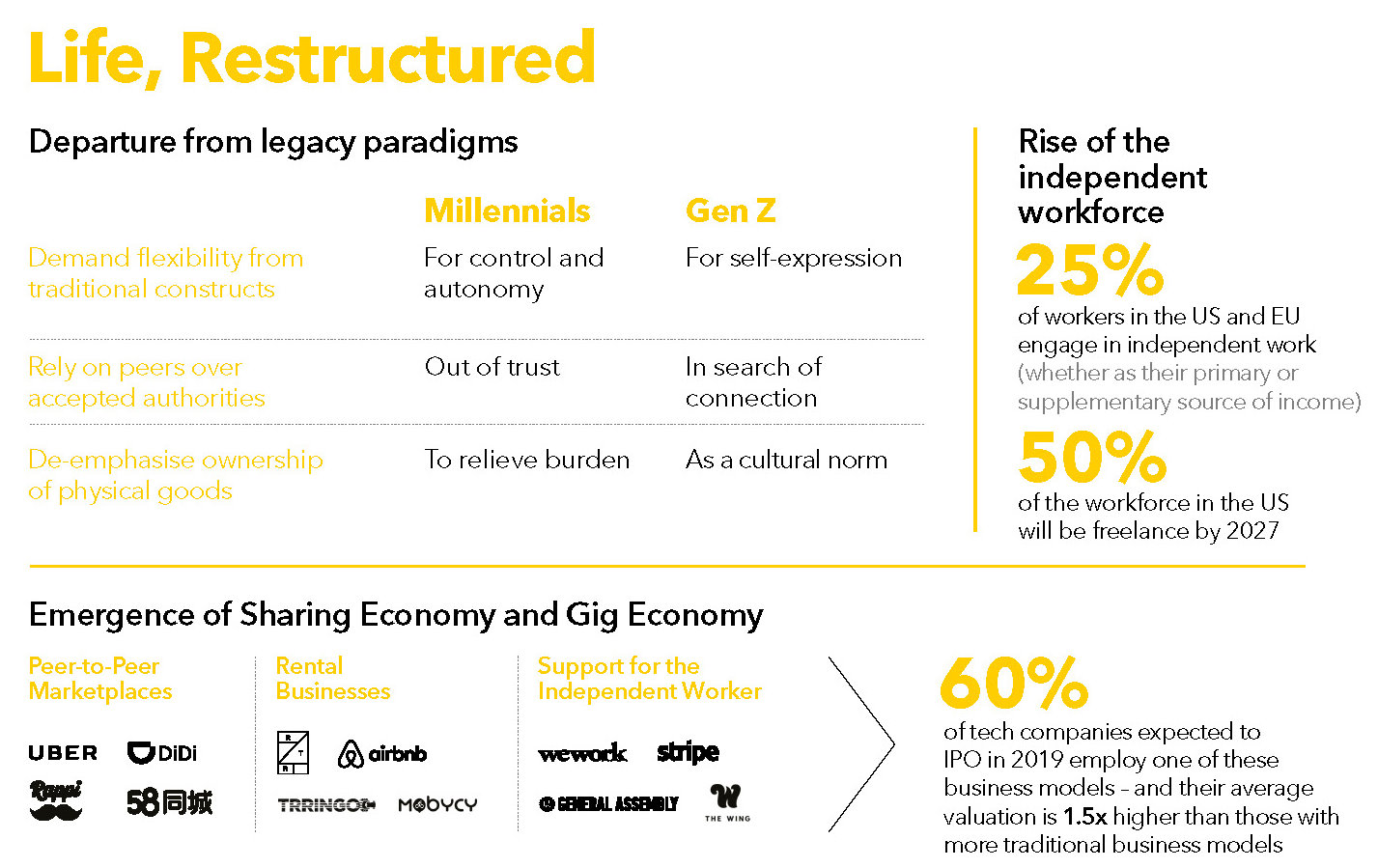
趨勢三:革命化的數據(詳細說明在報告第9頁)
通過物聯網和機器學習的數據已成為經濟的推動力—實現前所未有的個性化和連接性。
物聯網(IoT)和機器學習將提供前所未有更好地理解和預測結果的能力,成為新的應用、策略和業務計劃的關鍵。 這些技術為旅遊業提供了巨大的機會,可以提供連結、客制化和整合的客戶體驗。 但更重要的是,這些都需要信任和負起責任。 消費者可以透過智能設備收集數據、接觸資訊來增強能力—但也讓消費者在安全、保密和隱私方面愈來愈感到不安。
DATA, REVOLUTIONISED
Data, through the Internet of Things and machine learning, has become a driving force of the economy- enabling unprecedented
The Internet of Things (IoT) and machine learning will deliver unprecedented ability to better understand and predict outcomes, becoming the lynchpin of new applications, strategies

趨勢四:重新分配的權力 (詳細說明在報告第12頁)
從西方到東方以及從國家到城市的權力和人口的變化,正在重新定義影響力中心,並重塑全球市場,而個人則愈來愈流動並要求承擔責任。
未來幾十年的特徵就是不斷變化的動態權力,並產生新的影響力中心。地理上向東方和南方轉移、不斷顯著增加的亞洲中產階級,以及日益增長的都市化都將對全球市場產生巨大影響。這場權力革命將需要旅遊業滿足最受歡迎的消費者的需求,並可能迫使他們在當今的超連結世界中應對這些轉變的影響。旅行和旅遊組織有很大的潛力接受新的機會,但他們還需要深刻理解和發展出對社會議題的觀點,以塑造自己的未來。
POWER, REDISTRIBUTED
Power and demographic shifts from West to East and nations to cities are redefining centers of influence and reshaping global markets, while individuals increasingly
The coming decades will be marked by changing power dynamics resulting in the emergence of new
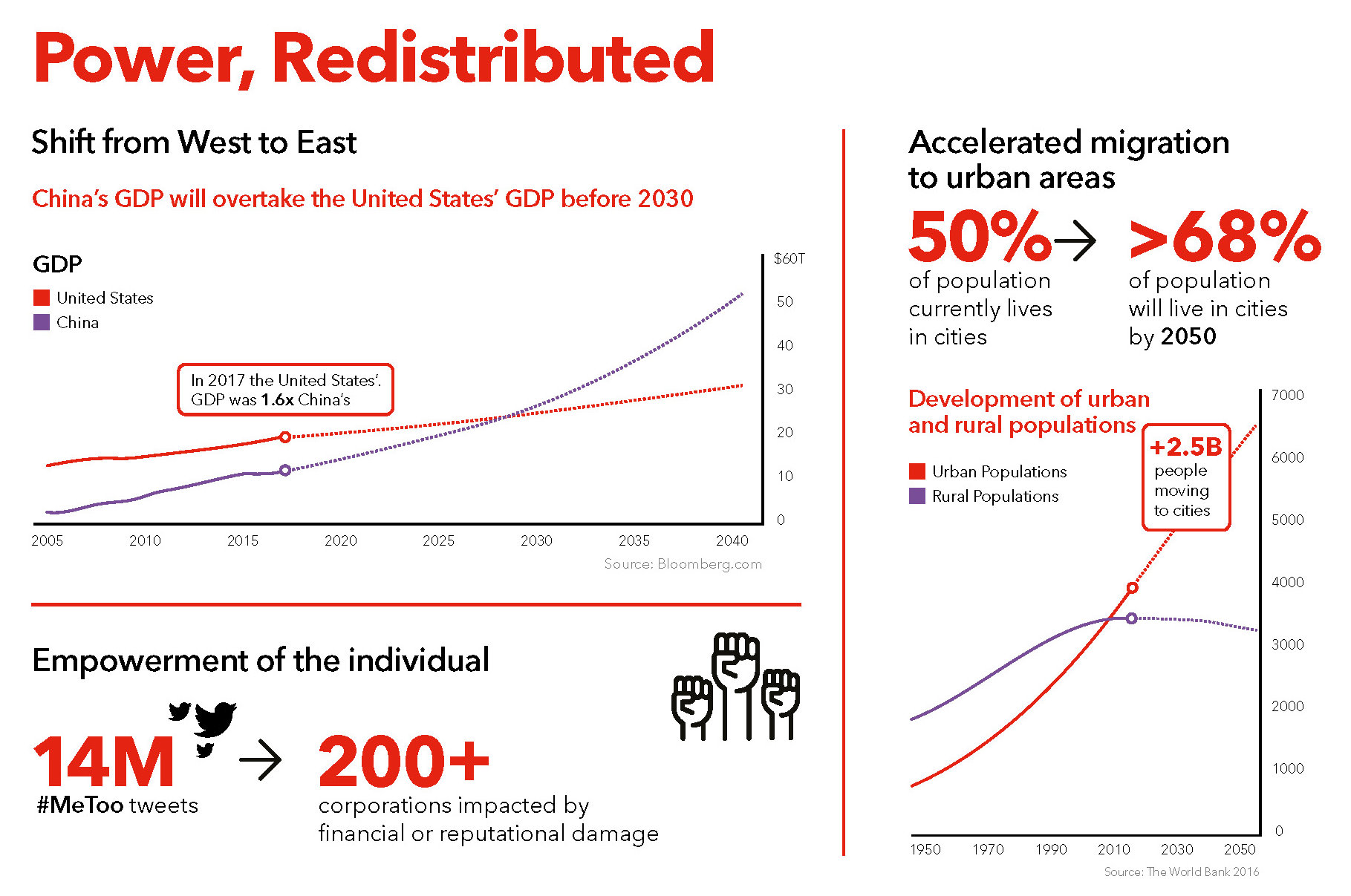
趨勢五:重新設想消費模式 (詳細說明在報告第15頁)
為了因應不斷惡化的環境風險,消費者已經意識到,必須將生活方式轉化為更具環境倫理與資源效率,也因此激發了年輕一代新的消費決策。
隨著地球資源的取得和健康日益受到威脅,需要負責任地平衡短期和長期的優先事項。現有商業模式的永續性受到質疑,因此私營部門面臨更嚴格的審查和環保行動壓力。在這樣的背景下,永續商業實務可以成為旅遊業強有力成長的核心策略,讓保護景點、環境先導和社區健康成為顧客體驗不可或缺的一部分。
CONSUMPTION, REIMAGINED
As a response to escalating environment risks, consumer awareness has translated into more ethical and resource-efficient lifestyles and which are driving the decision-making of younger generations.
As the availability of resources and health of our planet are increasingly threatened, there is a need for responsibly balancing short and long-term priorities. The durability of existing business models
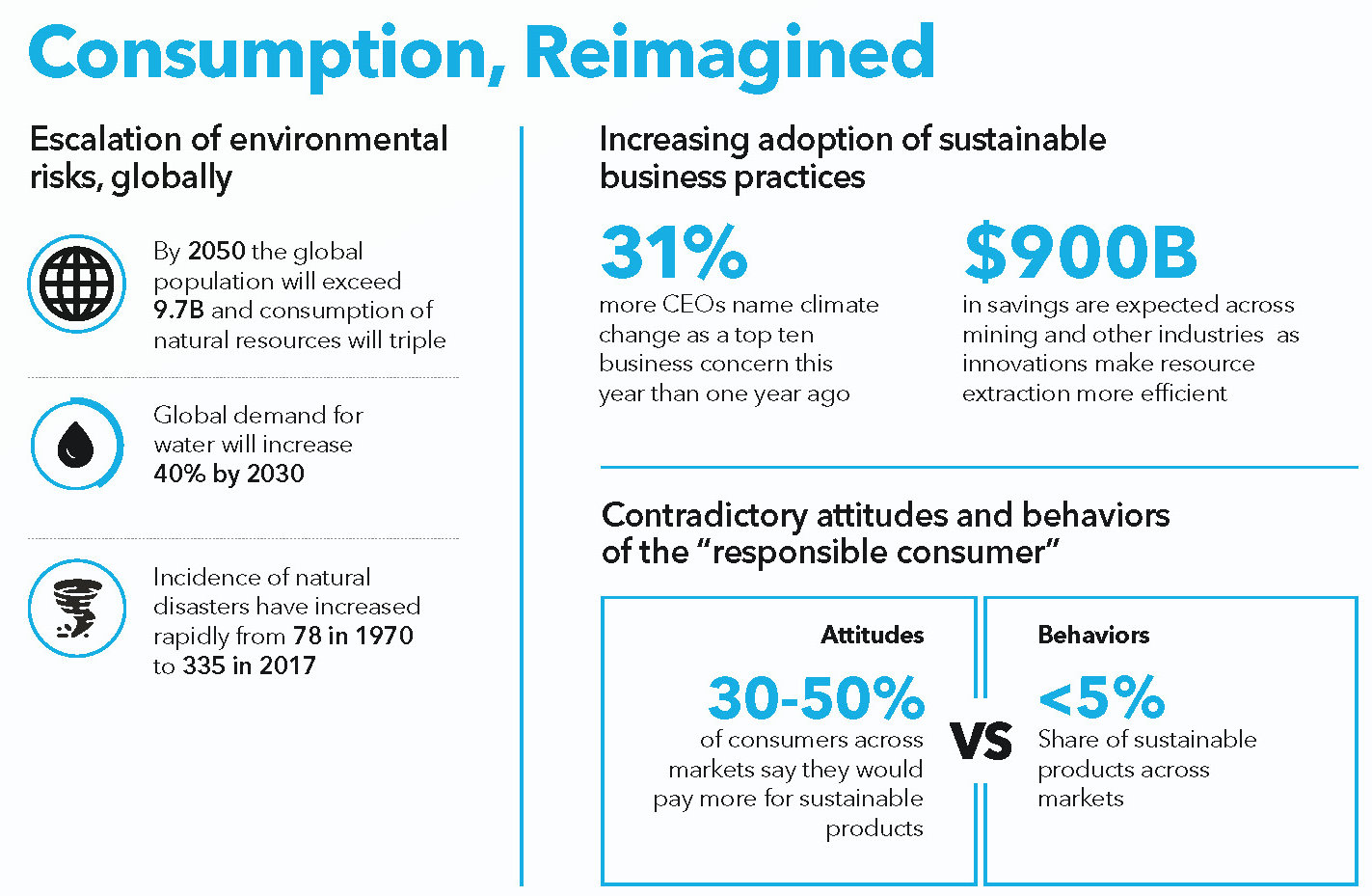
報告原文(英文)下載處:https://www.wttc.org/-/media/files/reports/2019/megatrends-2019—world-transformed.pdf
延伸閱讀:

